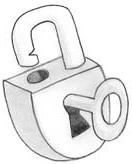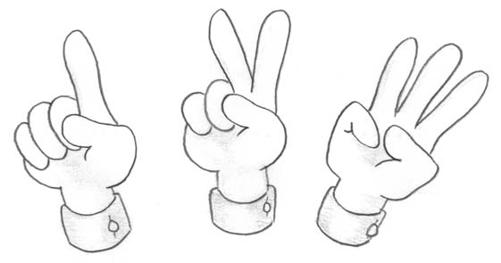The 1-2-3 Magic Workbook for Christian Parents: Effective Discipline for Children 2-12 (5 page)
Read The 1-2-3 Magic Workbook for Christian Parents: Effective Discipline for Children 2-12 Online
Authors: Thomas W. Phelan,Chris Webb
Tags: #Family & Relationships, #Parenting, #General

The two biggest mistakes that parents and teachers make in
dealing with children are these: Too Much Talking and Too Much
Emotion. As we just saw, thinking of kids as little adults and then talking
and chattering too much is bad because it either doesn’t work or it takes
you through the Talk-Persuade-Argue-Yell-Hit Syndrome
.
Ironically, too
much talking and explaining makes kids less likely to cooperate because
it irritates and distracts them.
Why is too much emotion destructive? Don’t people today tell you
to “let it all hang out” and show your feelings? “Express yourself and
don’t keep it all inside” is the advice of the moment.
Is this a good suggestion if you are a parent? One-half of it is good advice
and the other half is not. The good half is this: If you are feeling positively
toward a child, by all means let it show. Express your affection. You are
not going to do anything harmful and you will do some good.
The bad half of this advice, though, applies to times when you are
irritated or angry with your children. “Letting it all hang out” at these
moments can be a problem, because when we parents are mad we often
do the wrong thing. Angry adults can yell, scream, belittle and nag; they
19

20 1-2-3 MAGIC
can also physically endanger their kids.
1-2-3 Magic
is as much a control
on parental anger as it is a control on children’s behavior. Uncontrolled
expression of parental aggravation is never a good idea.
There is another reason why too much emotion can interfere with
effective parenting and effective teaching. When they are little, kids feel
inferior. They feel inferior because they
are
inferior. They are smaller,
less privileged, less intelligent, less skillful, less responsible and less of
just about everything than their parents and the
Key Concepts… older kids. And this “lessness” bugs them a lot.
If you have a child who
They don’t like it. They do like to feel they are
is doing something
powerful and capable of making some mark on
you don’t like,
the world.
get real upset
Watch your two-year-olds. They want to be
about it on a
regular basis and,
like the five-year-olds, who can do a lot more
sure enough, she’ll repeat neat things. The five-year-olds, in turn, want to
it for you!
be like the ten-year olds. And the ten-year-olds
want to be like you; they want to drive cars and
use credit cards! They want to have some impact on the world and to
make things happen.
Have you ever seen a small child go down to a lake and throw rocks
in the water? Children can do that for hours, partly because the big splashes
are a sign of their impact. They are the ones causing all the commotion.
What does throwing rocks in the water have to do with what happens at
home? Simple. If your little child can get big-old-you all upset,
your upset
is the big splash for him
. Your upset makes your child feel powerful. His
reacting this way does not mean that he has no conscience and is going to
grow up to be a professional criminal. It’s just a normal childhood feel-
ing: Having all that power temporarily rewards—or feels good to—the
inferior part of the child. Parents who say, “It drives me absolutely crazy
when she eats her dinner with her fingers!! Why does she do that?!” may
have already answered their own question. She may do that—at least
partly—
because it drives them crazy.
An important rule, therefore, is this: If you have a child who is doing
something you don’t like, get real upset about it on a regular basis and,
sure enough, she’ll repeat it for you.
THE TWO BIGGEST DISCIPLINE MISTAKES 21
When it comes to discipline, you want to be consistent, decisive and
calm. So what we recommend in
1-2-3 Magic
is that you apply—during
moments involving conflict or discipline—what we call the “No-Talking
and No-Emotion” Rules. Since we’re all human, these two rules really
mean very little talking and very little emotion.
This point is absolutely
critical to your effectiveness
. There are discipline systems other than the
1-2-3, but you will ruin any of them by talking too much and getting too
excited. These two mistakes, of course, usually go hand in hand, and the
emotion involved is usually anger.
Some parents and teachers can turn off the talking and the emotional
upset like a faucet, especially once they see how effective it is to keep
quiet at the right times. Other adults, however, have to bite their lips
bloody to get the job done. I saw a T-shirt the other day that said, “Help
me—I’m talking and I can’t stop!” Lots of moms, dads and teachers
have to remind themselves over and over and over again that talking,
arguing, yelling and screaming not only don’t help, they actually make
things worse. These “tactics” merely blow off steam for a few seconds.
If, after a month to six weeks of using
1-2-3 Magic
, parents find that they
can’t shake these habits, it’s time to face facts: Some sort of outpatient
evaluation and counseling is indicated (for the adult, not the child!).
Chapter Summary:
Too Much Talking
Too Much Emotion
Part II
Controlling Obnoxious
Behavior

5
Counting Obnoxious Behavior
You want your children to (1) learn to think and
(2) take responsibility for their own behavior.
Your kids are acting up. You know now you’re not supposed to get too
excited and start chattering. So just what are you supposed to do?
To help with your first giant parenting step—controlling obnoxious
behavior—we’ll describe the 1-2-3, or counting. Counting is surprisingly
powerful and deceptively simple, but you have to know what you’re do-
ing. Here in the beginning, keep two things in mind.
First, you will use the 1-2-3, or counting method, to deal with Stop
(obnoxious or difficult) behavior. In other words, you will be counting
things like arguing, fighting, whining, yelling, tantrums, etc. You will
not use the 1-2-3 to get the child up in the morning, to get her to do her
homework or to motivate her to practice the piano.
Second, if you are new to
1-2-3 Magic
, after you hear how to do the
1-2-3, you will be skeptical. The procedure will seem too easy; it may
not appear aggressive or tough enough. Some of you will think, “Hey,
you don’t know my kid. This kid is a wild man!”
Don’t worry about feeling skeptical. Remember the 1-2-3
is
decep-
tively simple, but it is not always easy. The “magic” is not in the counting.
Anyone can count. The magic—or what may seem like magic—is in the
25
26 1-2-3 MAGIC
No-Talking and No-Emotion Rules, which make children think and take
responsibility for their own behavior.
Of course, there really is no magic in
1-2-3 Magic
. It just seems that
way. The program represents the careful, logical and persistent extension
of a special behavioral technology to the gentle discipline and training of
children. Soon—when conflicts with kids arise—you will feel like a new
person: consistent, decisive and calm.
Undoubtedly, after our initial explanation, you will have questions.
We will attempt to answer all of your questions in the next chapter. After
that, and after you have read through the information in Chapters 6-10,
you can begin counting.
Counting Difficult Behavior
How does the 1-2-3 work? Imagine you have a four-year-old child (some of
you don’t have to imagine!). This child is having a major temper tantrum on
the kitchen floor at 6 p.m. because you—in your hardness of heart—would
not give him a small bag of potato chips right before dinner. Your son
is banging his head on the floor, kicking your new kitchen cabinets, and
screaming bloody murder. You are sure the neighbors can hear the noise
all the way down the block, and you’re at a loss for what to do.
Your pediatrician told you to ignore your son’s temper tantrums,
but you don’t think you can stand it. Your mother told you to put a cold
washcloth on the youngster’s face, but you think her advice is strange.
And, finally, your husband told you to spank the boy.
None of these is an acceptable alternative. Instead, with the 1-2-3,
you hold up one finger, look down at your noisy little devil, and calmly
say, “That’s 1.”
He doesn’t care. He’s insane with rage and keeps his tantrum going
full blast. You let five seconds go by, then you hold up two fingers and
say, “That’s 2.” You get the same lousy reaction; the tantrum continues.
So after five more seconds, you hold up three fingers and say, “That’s 3,
take 5.”
Now what does all this mean? It means that your son was just given
two chances—the first two counts—to shape up. But in this instance he
blew it—he didn’t shape up. So there is going to be a consequence. The

COUNTING OBNOXIOUS BEHAVIOR 27
consequence can be a “rest period” or “time out” (about one minute per
year of the child’s life), or the consequence can be what we call a “time
out alternative” (loss of a privilege or toy for a period of time, bedtime
fifteen minutes earlier, twenty-five cents off the allowance, no electronic
entertainment for two hours, etc.)
Let’s imagine the consequence you choose is a rest period or time
out. (Time outs work just fine, by the way, if they are administered fairly
by non-tantruming adults.) After you say “That’s 3, take 5,” the child goes
to time out. (Some of you are wondering, “How do I get him there?” That
question will be answered in the next chapter.)
After the time out is served, you will not believe what happens
next. Nothing! No talking, no emotion, no apologies, no lectures, no
discussions. Nothing is said unless it is absolutely
necessary, which is usually not the case.
Quik Tip…
You do not say, for example, “Now, are you What is going to
going to be a good boy? Do you realize what happen, in a
you’ve been doing to your mother all afternoon?! relatively short
Why do we have to go through this all the time? period of time, is this:
I’m so sick and tired of this I could scream!! Now You’ll start getting good
control—believe it or